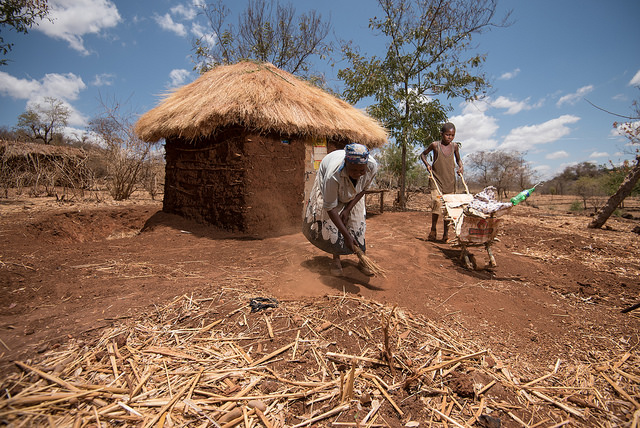
Find the entire reflection guide here.
“‘One does not live by bread alone but by every word that comes forth from the mouth of God.’”
- Matthew 4:4
In this first Sunday of Lent, we are offered two stories to reflect on. In both stories, we are challenged to recall our radical dependence on God, our Creator.
In the creation story, we hear of God creating human beings out of the earth, recalling our intimate relationship with the earth and our Creator. We also are invited to reflect on the ruptures in our relationship with God, reflected in Adam and Eve’s choice to steal fruit from the tree of life in their desire to be like God. Pope Francis writes in Laudato Si’, “The harmony between the Creator, humanity, and creation as a whole was disrupted by our presuming to take the place of God and refusing to acknowledge our creaturely limitations.” When we act towards creation out of greed and lack of respect for its order and beauty, we damage our relationship with God.
Similarly, in the narrative of Jesus’s temptation in the desert, we are invited to remember our ultimate dependence on God as the source, destination, and foundation of our lives. Jesus rejects the temptation of worldly power and insists that God is the foundation of life.
Our dependence on God as creatures is something we have in common with all creation. Once we recall this, we can recognize our call to act with brotherly and sisterly care for all people and created life. How have we ignored our common dependence on God, acting in a spirit of domination over other people and wildlife? How have we supported systems that harm and dominate vulnerable people and ecosystems?
The global, industrial food production system is one way in which we witness the abuse and domination of the earth and vulnerable people by powerful groups. Large companies dominate agricultural production in many countries around the world, using unsustainable farming practices and putting profit over the wellbeing of communities. Maryknoll missioners and small-scale farmers in impoverished countries speak out against the ways in which these industrial production systems can disrupt local farming practices, destroy ecosystems in the long-term, and perpetuate poverty by interrupting local economies.
Returned Maryknoll Lay Missioner Jean Walsh describes what she witnessed in Mexico: “Over the years, many farmers were encouraged to adopt chemical-intensive farming methods. After [a while] the soil became depleted and required increased amounts of chemicals. Given the drop in production and high cost of chemicals, farmers were forced to leave their lands because they no longer produced food to feed their families.”
This week, let us pray for a “loving awareness that we are not disconnected from the rest of creatures, but joined in a splendid universal communion” (Laudato Si’). Then, let us ask for mercy for the ways in which we contribute to broken relationships with God, our brothers and sisters, and the earth, and for courage to heal these relationships.
Questions for Reflection
What experiences have led you to remember your dependence on God?
Where do you witness the harmful domination of vulnerable people and wildlife?
Pray
All-powerful God, you are present in the whole universe and in the smallest of your creatures.
You embrace with your tenderness all that exists.
Pour out upon us the power of your love,
that we may protect life and beauty.
Fill us with peace, that we may live
as brothers and sisters, harming no one.
O God of the poor,
help us to rescue the abandoned and forgotten of this earth,
so precious in your eyes.
Bring healing to our lives,
that we may protect the world and not prey on it,
that we may sow beauty, not pollution and destruction.
Touch the hearts
of those who look only for gain
at the expense of the poor and the earth.
Teach us to discover the worth of each thing,
to be filled with awe and contemplation,
to recognize that we are profoundly united
with every creature
as we journey towards your infinite light.
We thank you for being with us each day.
Encourage us, we pray, in our struggle
for justice, love and peace.
- A prayer for our earth, Laudato Si’
Fast
Commit to buying food from local farmers or organic farms as your budget will allow this Lent. Read about the benefits of organic and local farming from the Food and Agriculture Organization (FAO): http://bit.ly/FAOOrganic
Act
1) Learn about the benefits of agroecology, or farming methods that prioritize sustainability and the needs of communities: http://bit.ly/agroecologyCIDSE
2) Sign up for the action alerts of the National Sustainable Agriculture Coaltion to raise your voice in support of sustainable farming: http://bit.ly/sustainableAG
Maryknoll Missioner Experience
“Today only 8 percent of Kenya’s land is arable. Practices like cutting trees for cooking fuel leads to deforestation and land desertification. This brings an increase in landslides, lower rainfall levels, decreased watershed areas, and an increase in drought. Parts of Kenya, especially in the north, are almost always dry, forcing pastoralists to wander in search of good pasture for their livestock.”
Practices like cutting trees for cooking fuel leads to deforestation and land desertification. This brings an increase in landslides, lower rainfall levels, decreased watershed areas, and an increase in drought. Parts of Kenya, especially in the north, are almost always dry, forcing pastoralists to wander in search of good pasture for their livestock.”
- Charlotte Cook
Returned Maryknoll Lay Missioner
First Sunday of Lent: Top image of tree in a field licensed in the public domain and available at http://bit.ly/treecornfield. Image of woman farming courtesy of Trocaire (IR).
